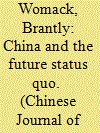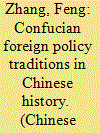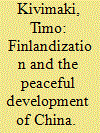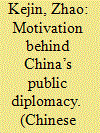| Srl | Item |
| 1 |
ID:
139156


|
|
|
|
|
| Summary/Abstract |
Although China’s underlying capabilities have developed at a fairly steady pace over the past 20 years and its ambitions have remained relatively stable, the shock of uncertainty and relative change since 2008 has driven an ongoing interaction between heightened international anxiety over China’s rise and greater assertiveness on China’s part. In academic circles, the question is raised whether China is a status quo power willing to be a stakeholder in the existing international system, or whether it has ambitions to be a revisionist power challenging the existing order. The resulting tension is especially acute in East Asia and in relations between China and the United States. Given the novel dynamics of the current era of global economic uncertainty, international normalcy should not be judged by the status quo of the post-Cold War era but rather by a ‘status ad quem’, a future situation of sustainable relationships in a post-hegemonic era. The prospective diplomacy of all states should be judged by the likelihood of their accommodation to a new era.
|
|
|
|
|
|
|
|
|
|
|
|
|
|
|
|
| 2 |
ID:
139159


|
|
|
|
|
| Summary/Abstract |
Can Confucianism enrich Chinese foreign policy? This article seeks to explore major traditions of Confucian foreign policy in imperial Chinese history and suggest their implications for contemporary Chinese foreign policy. The popular notion of Confucian pacifism is not a credible tradition of Confucian foreign policy, but a modern Chinese myth constructed in the early 20th century. Rather, Confucian foreign policy traditions were characterized by the contrasting ideas of inclusivism and exclusivism, neither of which renounced the use of force as a legitimate instrument of foreign policy. Both traditions were underpinned by a traditional Chinese theory of human nature. The adoption of inclusivism or exclusivism in foreign policy was a contingent outcome of relational interactions in China’s foreign relations. Confucianism’s inclusive humanism, reflected in the inclusive tradition, can provide a major intellectual inspiration for contemporary Chinese foreign policy. It can suggest a Confucian grand strategy of inclusive relationalism that significantly broadens the strategic vision of Chinese foreign policy. Chinese foreign policy discourse under President Xi Jinping already contains an important degree of inclusive relationalism. Putting this strategy more into practice will benefit both China and the world.
|
|
|
|
|
|
|
|
|
|
|
|
|
|
|
|
| 3 |
ID:
139157


|
|
|
|
|
| Summary/Abstract |
The rise of China has brought about new considerations and a debate in East Asian security studies. Several of the countries neighbouring China have been probed for their degree of ‘Finlandization’, as manifest in excessive attentiveness to the interests of a neighbouring great power, due to the power asymmetry between the ‘Finlandized’ and the ‘Finlandizer’. This article will scrutinize Finlandization and determine to what extent the power relationship between Finland and the Soviet Union can be compared with the emerging power relationship that China’s East Asian neighbours will have to tackle. Furthermore, this article will seek from the Finnish experience lessons for East Asia on how to adapt to power realities without making the mistakes that Finland and the Soviet Union made in their relationship. China’s East Asian neighbours could learn how to avoid compromising their autonomy from Finland’s mistakes. They could also learn from Finnish realism how to tackle the security dilemma that the rise of Chinese power involves, and how to seek security in a way that would not make the rising great power feel any less secure.
|
|
|
|
|
|
|
|
|
|
|
|
|
|
|
|
| 4 |
ID:
139158


|
|
|
|
|
| Summary/Abstract |
Since 2003, the Chinese government has launched a succession of public diplomacy campaigns and programmes, the dynamics, potentials and implications of which have drawn growing scrutiny from Chinese scholars and government officials. Based on document reviews and interviews with Chinese scholars, officials, and think tanks, however, this article finds that the focus of the existing literature is on the image China wishes to project to the outside world, and that there is still little consensus on the strategic motivations behind the country’s conduct of public diplomacy. In its conclusion, the article expounds that garnering international respect for China’s political and social system and respect domestically for its political legitimacy is what the Chinese government really cares about. This being the case, China will not be satisfied to be merely an emerging power in light of its greater ambition to rejuvenate its values and political system.
|
|
|
|
|
|
|
|
|
|
|
|
|
|
|
|